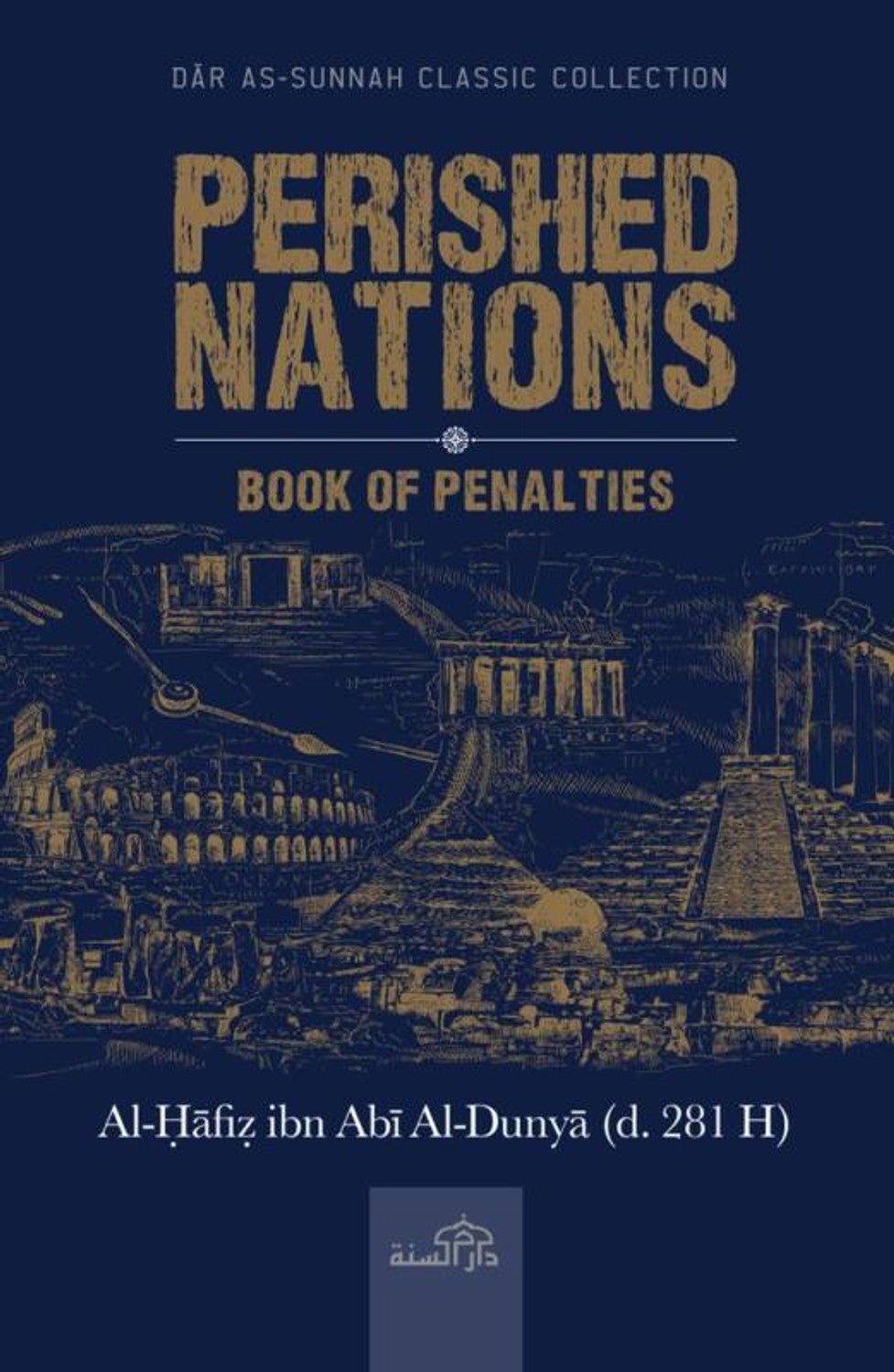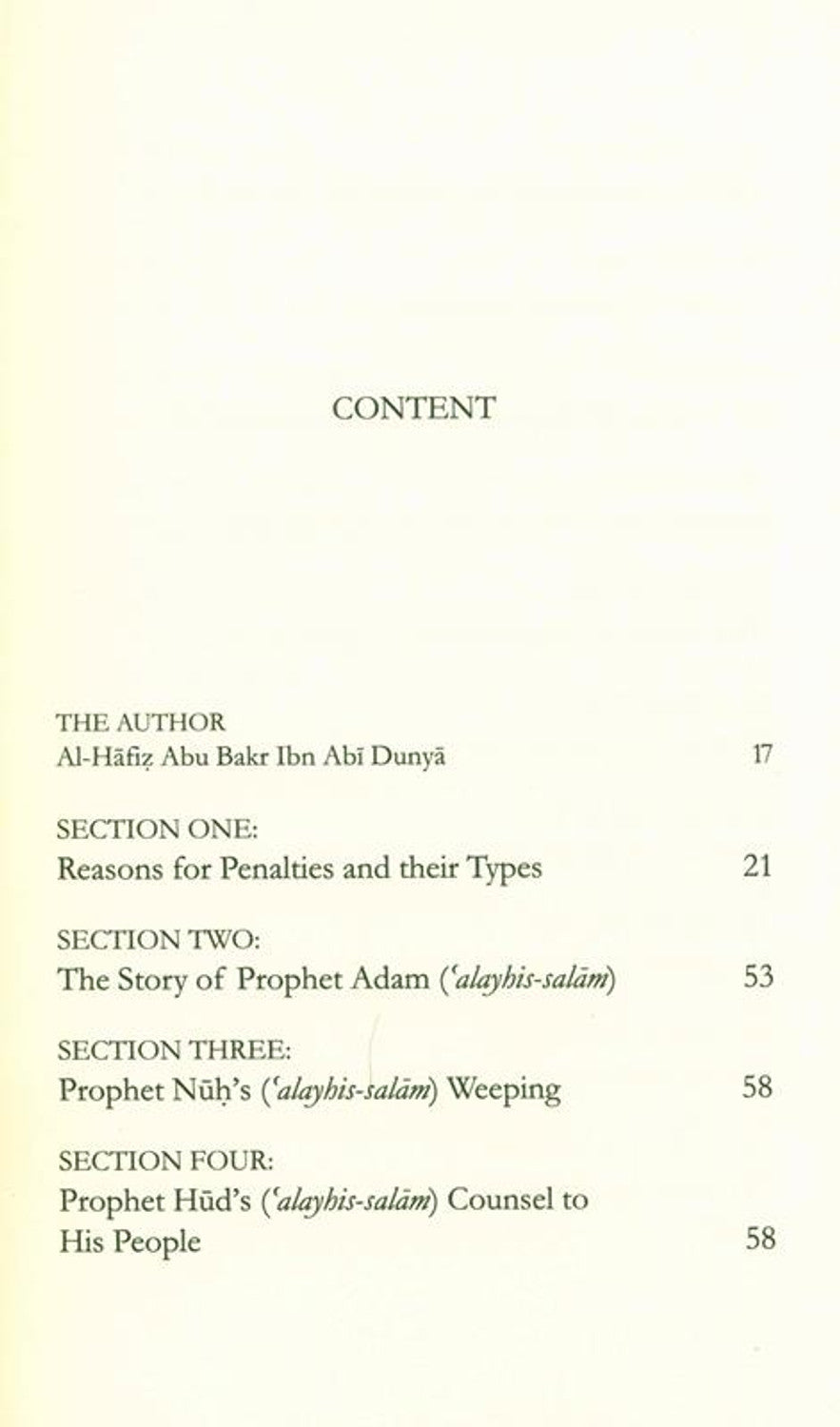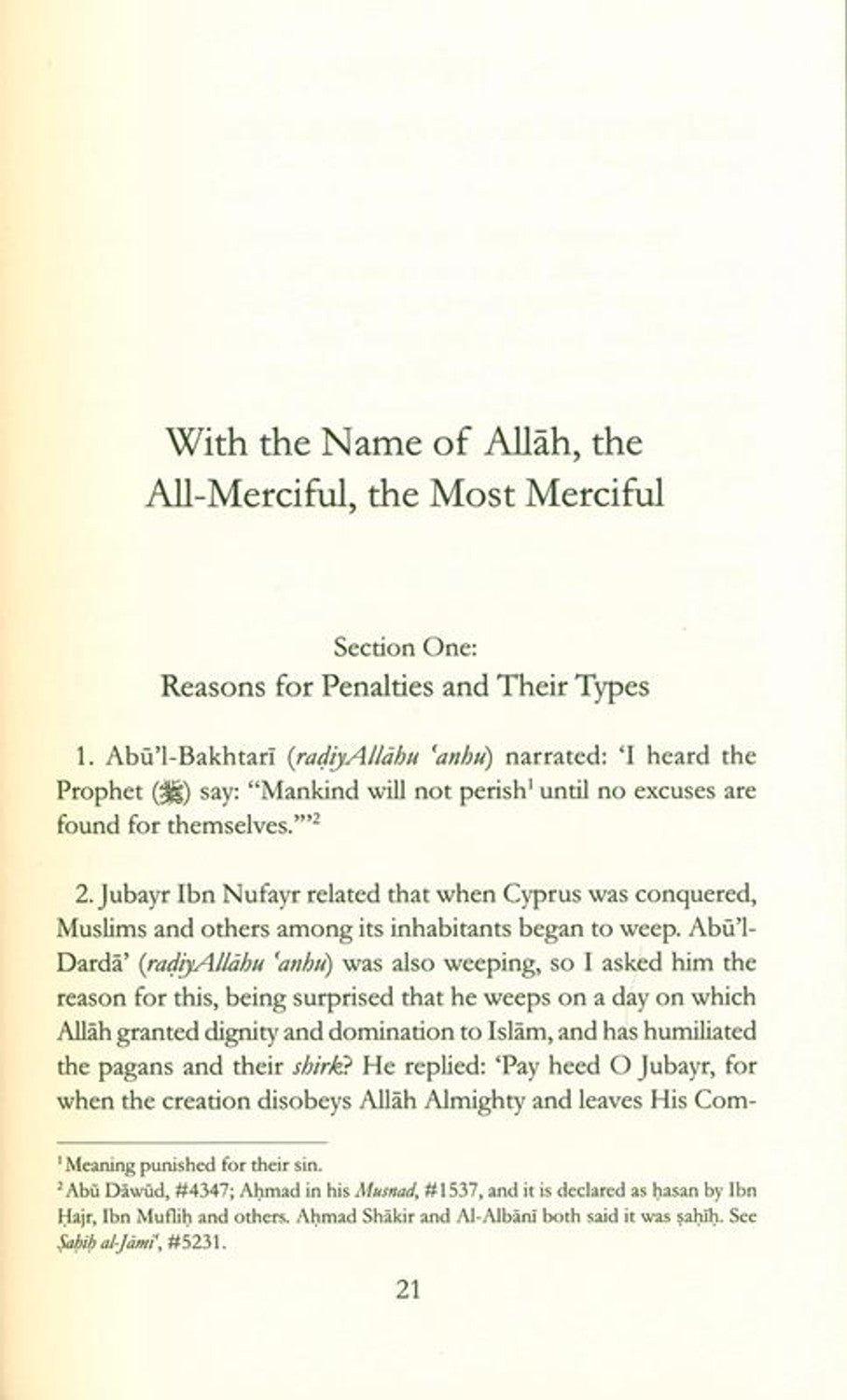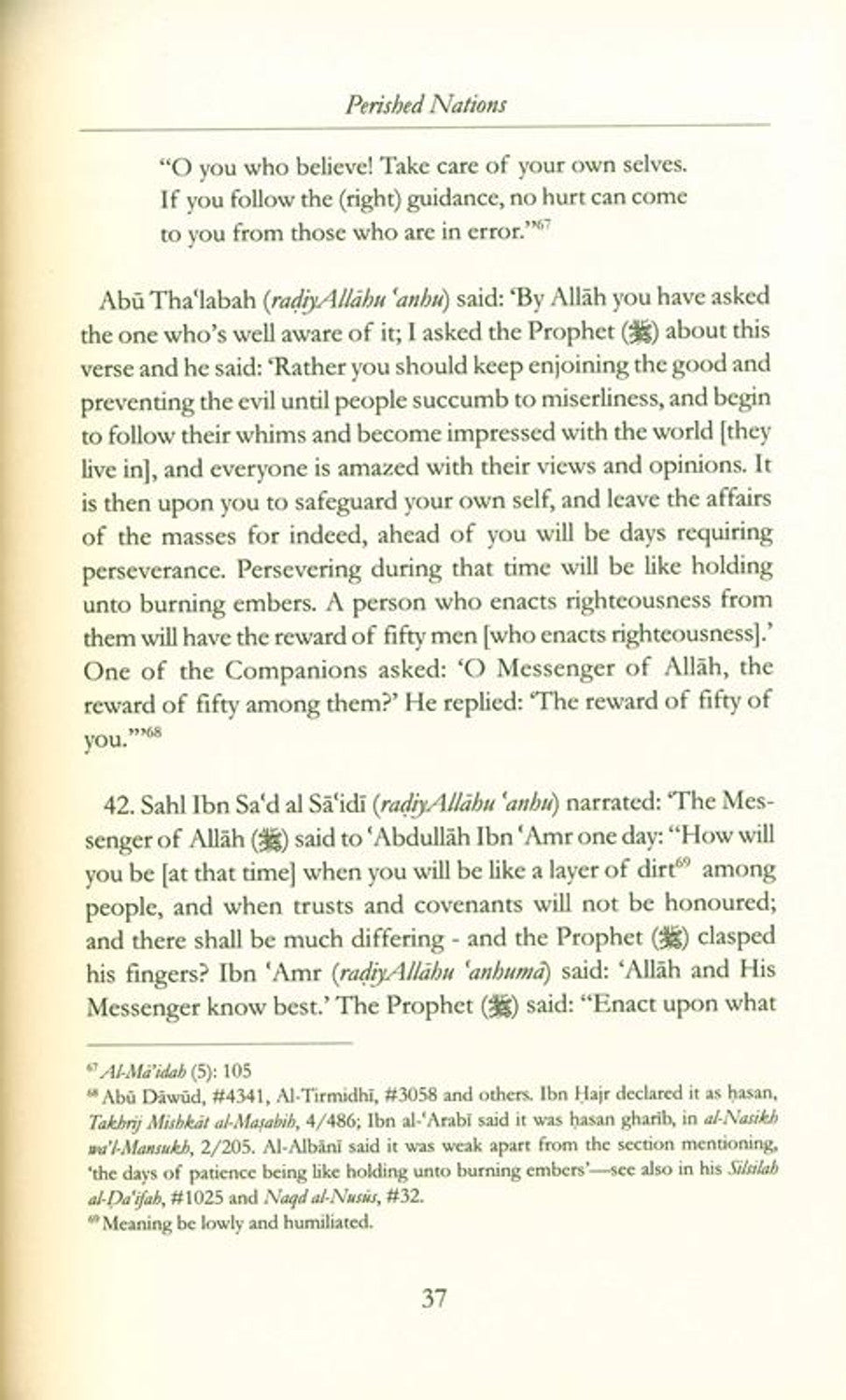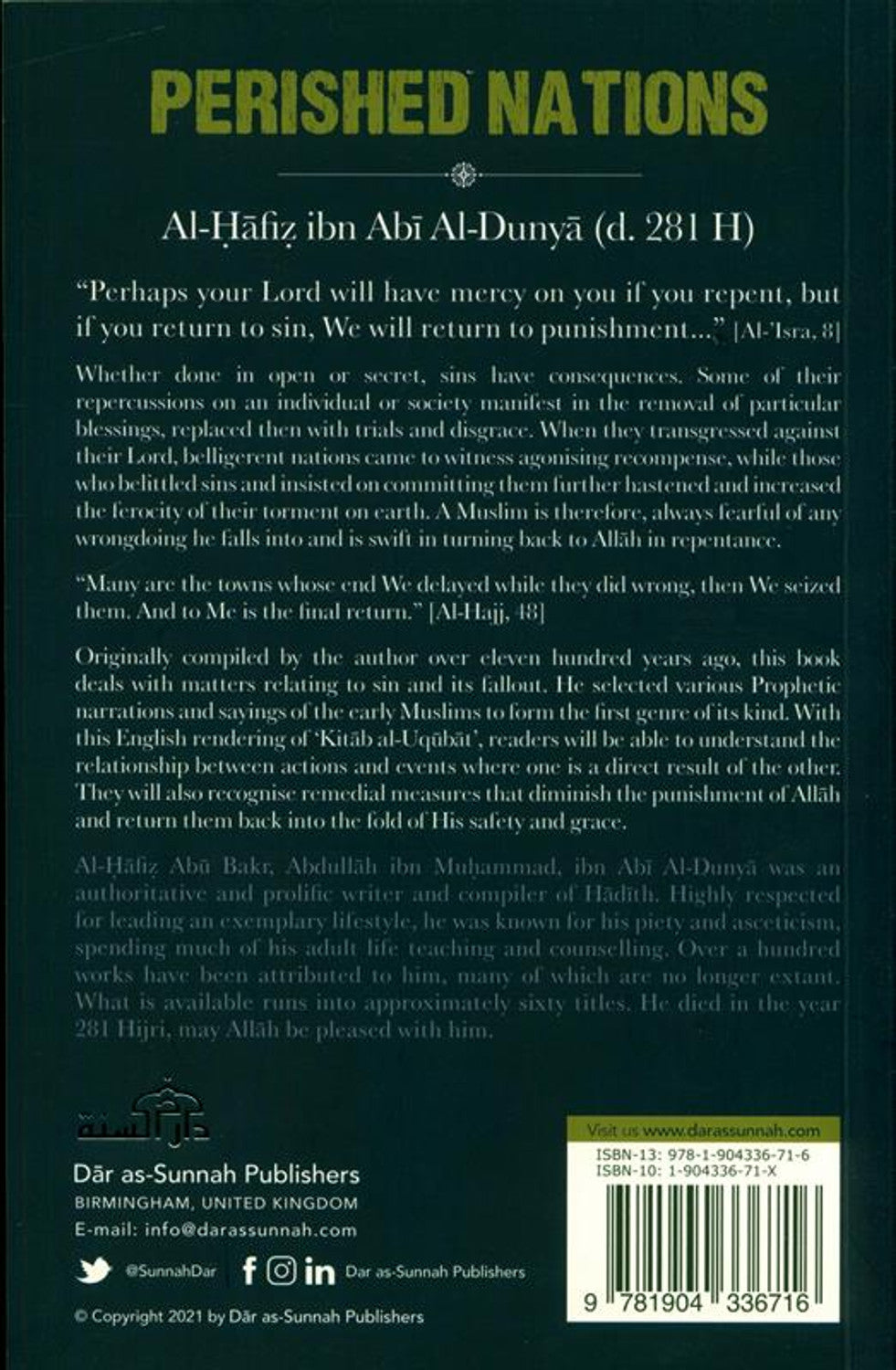Perished Nations Book of Penalties | Al-Hafiz Ibn Abi Al-Dunya
Perished Nations Book of Penalties | Al-Hafiz Ibn Abi Al-Dunya
Publisher:
Dar As Sunnah Publications
Author:
AL-HAFIZ IBN ABI AL-DUNYA
Language:
English
Binding:
Soft Cover
Pages: 176
Size: A5 |5.8 x 8.3 in| 14.8x 21 cm
Couldn't load pickup availability
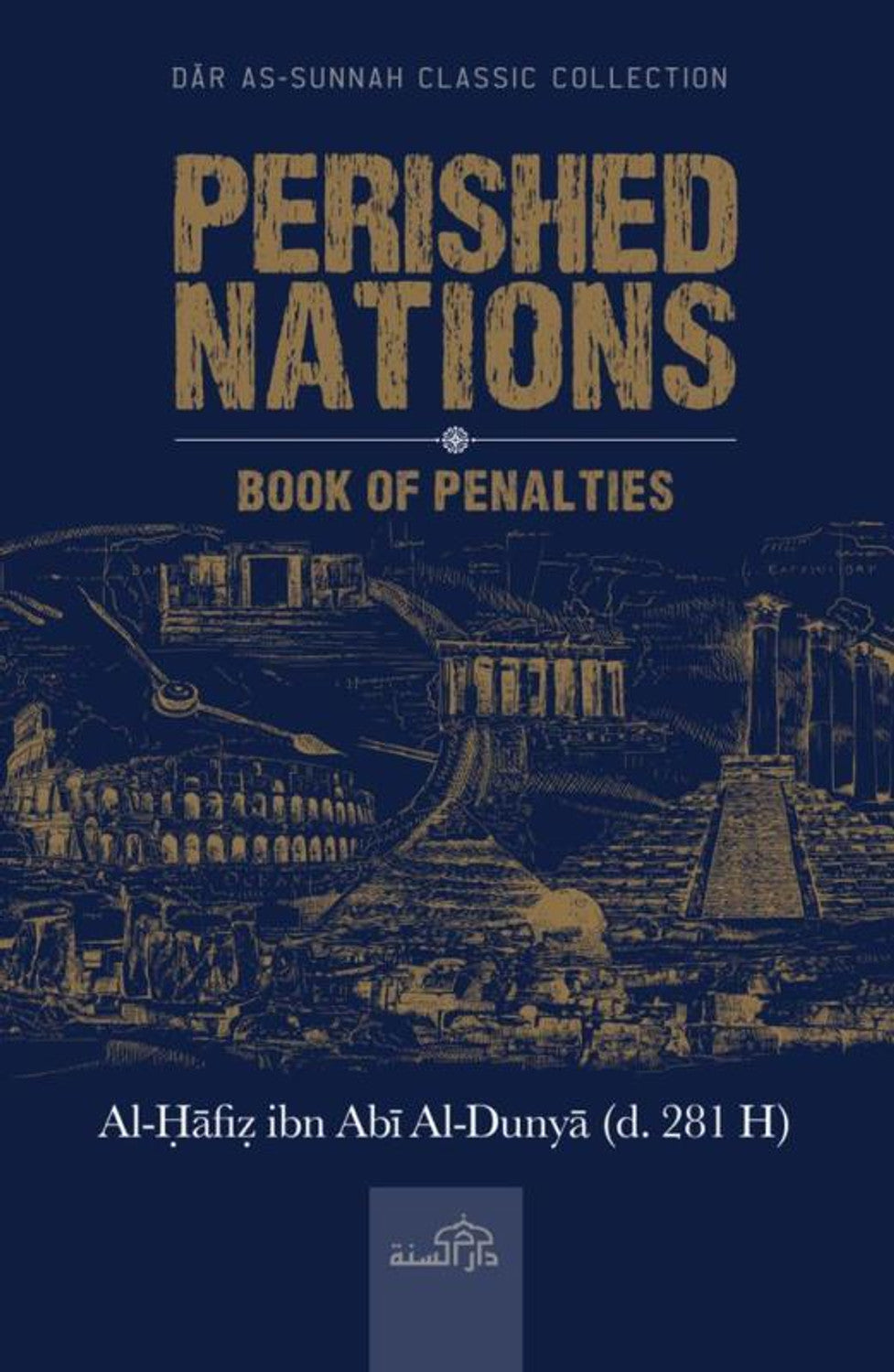
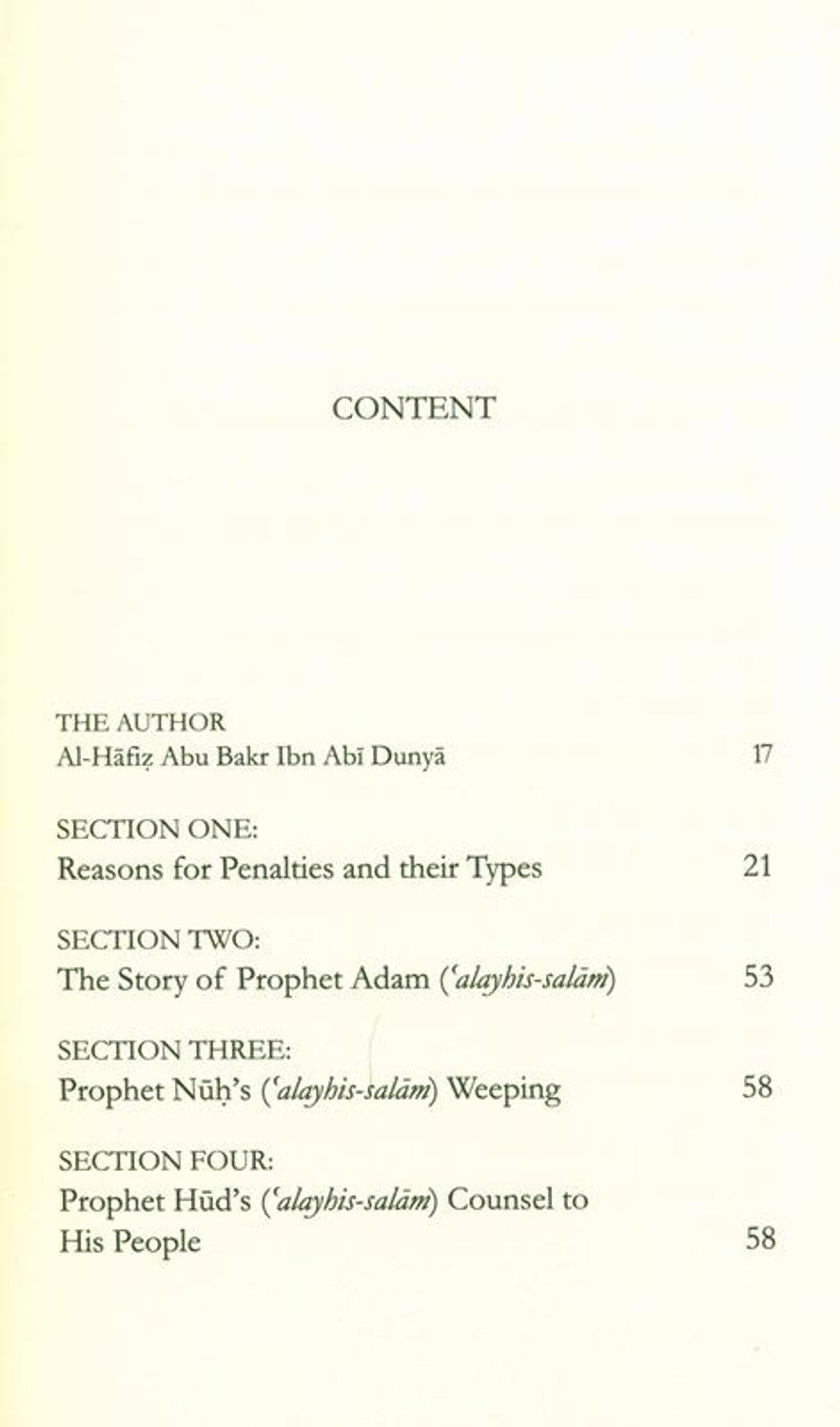
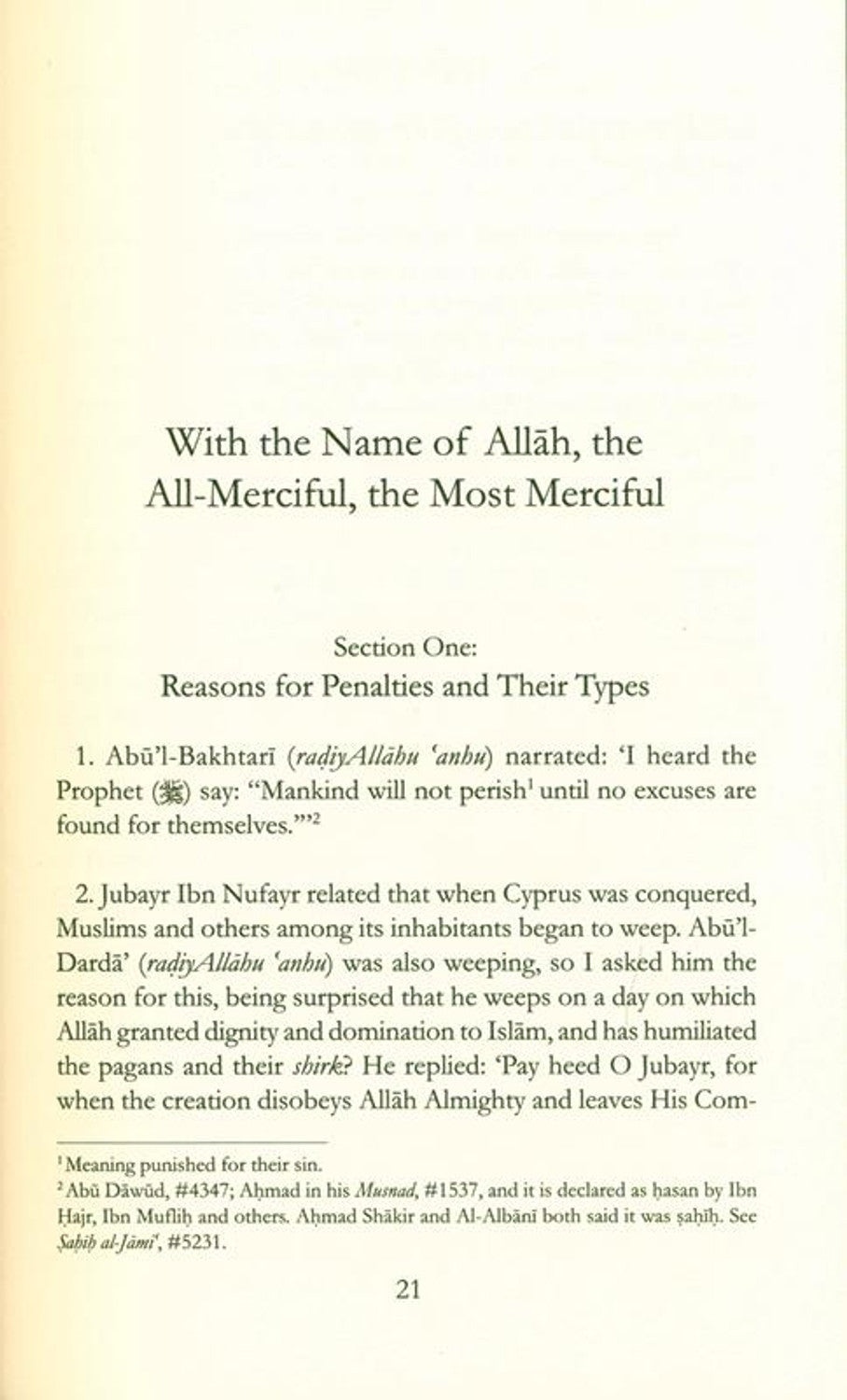
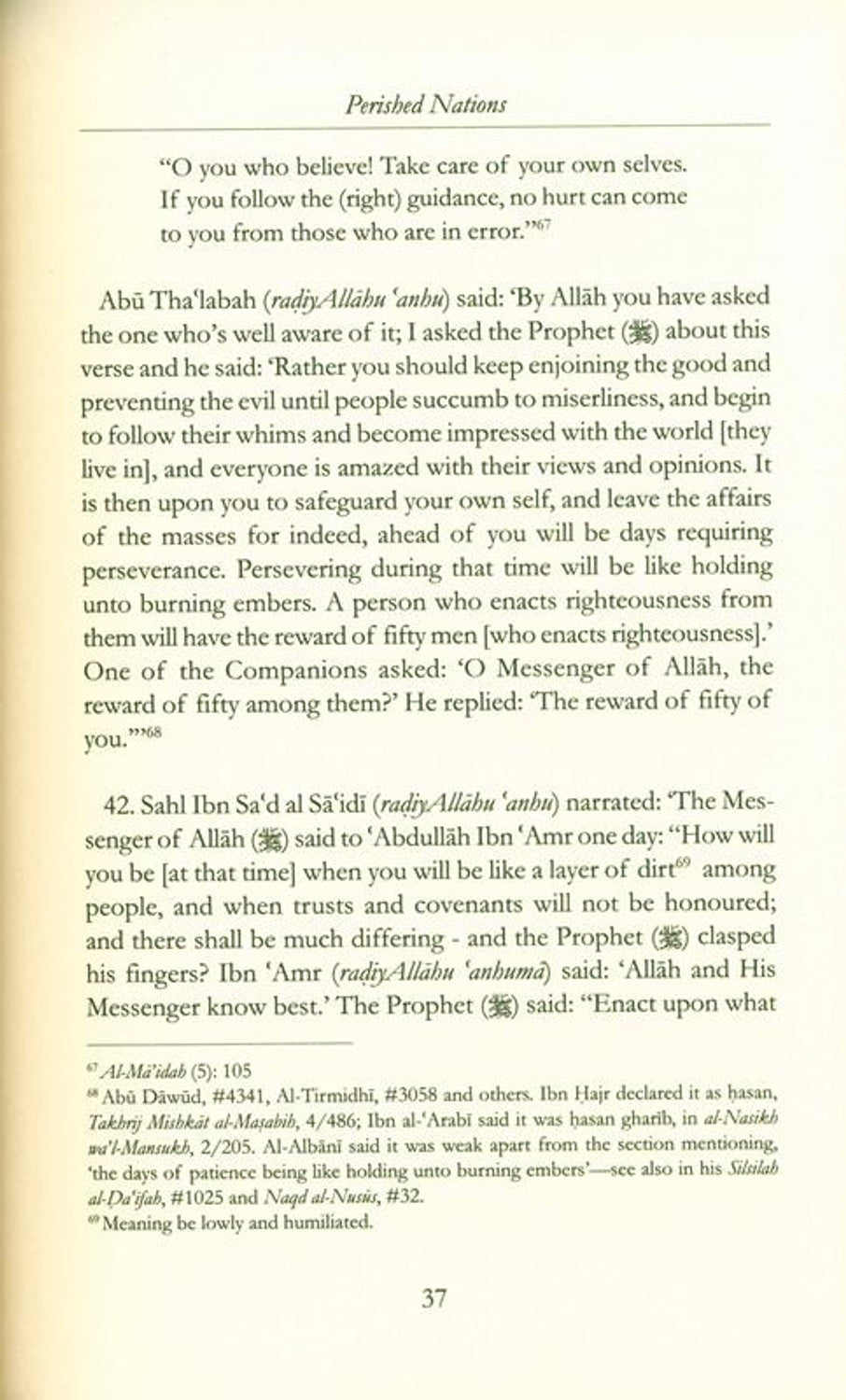
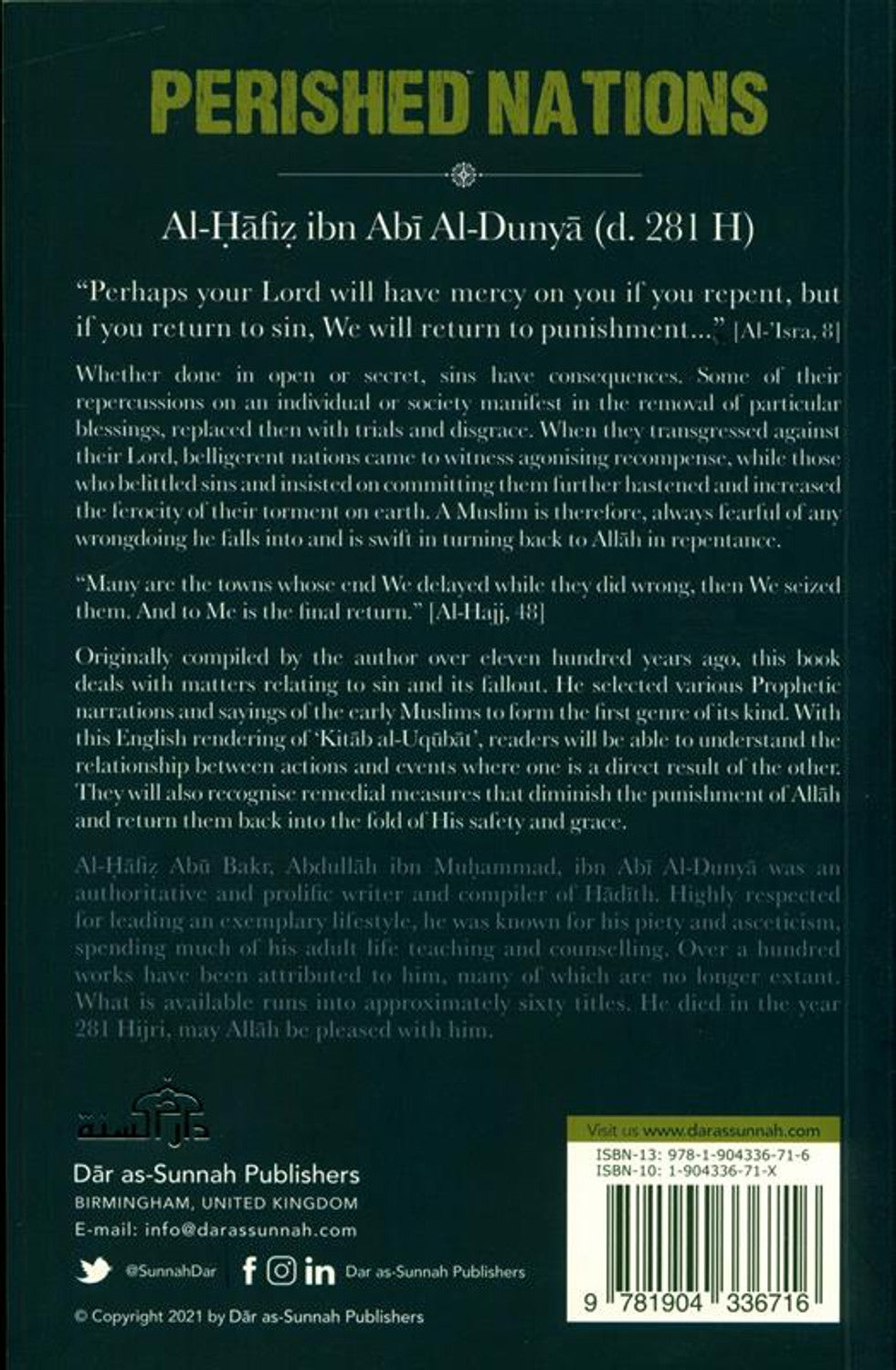
Collapsible content
Description of Book
The author of this ancient book, "Kitab al-Uqubat", compiled narrations and sayings from Prophets and early Muslims to emphasize the relationship between actions and consequences. Whether committed openly or in secret, sins have repercussions that can manifest in the removal of blessings and the onset of trials and disgrace. For those who persist in transgressing against their Lord, punishment and torment will surely follow, as witnessed by belligerent nations. As a Muslim, one must always be wary of wrongdoing and quickly seek repentance from Allah, as delaying it can lead to devastating results, as seen in the fate of many wrongdoers mentioned in the book. With this English translation, readers will gain insight into the domain of sin and learn how to prevent and mitigate its consequences through Allah's mercy and grace.
Publisher
Dar As Sunnah Publications
Author
- AL-HAFIZ IBN ABI AL-DUNYA
Sample Pages - Content
Page : 01
DAR AS-SUNNAH CLASSIC COLLECTION PERISHED NATIONS BOOK OF PENALTIES 1907807 Al-Hafiz ibn Abi Al-Dunyā (d. 281 H) سنة CAFFIVE DAY
Page : 02
CONTENT THE AUTHOR Al-Hafiz Abu Bakr Ibn Abi Dunya SECTION ONE: Reasons for Penalties and their Types SECTION TWO: 17 21 12 The Story of Prophet Adam ('alayhis-salām) 53 SECTION THREE: Prophet Nuh's (alayhis-salam) Weeping SECTION FOUR: Prophet Hüd's (alayhis-salam) Counsel to His People 58 58
Page : 03
With the Name of Allah, the All-Merciful, the Most Merciful Section One: Reasons for Penalties and Their Types 1. Abu'l-Bakhtari (radiy Allahu 'anhu) narrated: 'I heard the Prophet) say: "Mankind will not perish' until no excuses are found for themselves."""" 2. Jubayr Ibn Nufayr related that when Cyprus was conquered, Muslims and others among its inhabitants began to weep. Abu'l- Darda' (radiy Allahu 'anhu) was also weeping, so I asked him the reason for this, being surprised that he weeps on a day on which Allah granted dignity and domination to Islam, and has humiliated the pagans and their shirk? He replied: 'Pay heed O Jubayr, for when the creation disobeys Allah Almighty and leaves His Com- 'Meaning punished for their sin. 2 Abu Dawud, #4347; Ahmad in his Musnad, #1537, and it is declared as hasan by Ibn Hajr, Ibn Muflih and others. Aḥmad Shakir and Al-Albani both said it was ṣaḥih. See Sahih al-Jami', # 5231. 21
Page : 04
Perished Nations "O you who believe! Take care of your own selves. If you follow the (right) guidance, no hurt can come to you from those who are in error."67 Abu Tha'labah (radiyAllahu 'anhu) said: 'By Allah you have asked the one who's well aware of it; I asked the Prophet () about this verse and he said: 'Rather you should keep enjoining the good and preventing the evil until people succumb to miserliness, and begin to follow their whims and become impressed with the world [they live in], and everyone is amazed with their views and opinions. It is then upon you to safeguard your own self, and leave the affairs of the masses for indeed, ahead of you will be days requiring perseverance. Persevering during that time will be like holding unto burning embers. A person who enacts righteousness from them will have the reward of fifty men [who enacts righteousness].' One of the Companions asked: 'O Messenger of Allah, the reward of fifty among them?' He replied: "The reward of fifty of you." 39768 42. Sahl Ibn Sa'd al Sa'idi (radiy Allahu 'anhu) narrated: "The Mes- senger of Allah () said to 'Abdullah Ibn 'Amr one day: "How will you be [at that time] when you will be like a layer of dirt among people, and when trusts and covenants will not be honoured; and there shall be much differing - and the Prophet () clasped his fingers? Ibn 'Amr (radiyAllahu 'anhuma) said: 'Allah and His Messenger know best.' The Prophet () said: "Enact upon what Al-Ma'idah (5): 105 Abu Dawud, #4341, Al-Tirmidhi, #3058 and others. Ibn Hajr declared it as hasan, Takhrij Mishkat al-Masabih, 4/486; Ibn al-'Arabi said it was hasan gharib, in al-Nasikh wa'l-Mansukh, 2/205. Al-Albani said it was weak apart from the section mentioning, 'the days of patience being like holding unto burning embers'-see also in his Silsilab al-Da'ifah, #1025 and Naqd al-Nusus, #32. "Meaning be lowly and humiliated. 37
Page : 05
PERISHED NATIONS Al-Hafiz ibn Abi Al-Dunya (d. 281 H) "Perhaps your Lord will have mercy on you if you repent, but if you return to sin, We will return to punishment..." [Al-'Isra, 8] Whether done in open or secret, sins have consequences. Some of their repercussions on an individual or society manifest in the removal of particular blessings, replaced then with trials and disgrace. When they transgressed against their Lord, belligerent nations came to witness agonising recompense, while those who belittled sins and insisted on committing them further hastened and increased the ferocity of their torment on earth. A Muslim is therefore, always fearful of any wrongdoing he falls into and is swift in turning back to Allah in repentance. "Many are the towns whose end We delayed while they did wrong, then We seized them. And to Me is the final return." [Al-Hajj, 48] Originally compiled by the author over eleven hundred years ago, this book deals with matters relating to sin and its fallout. He selected various Prophetic narrations and sayings of the early Muslims to form the first genre of its kind. With this English rendering of Kitab al-Uqubat', readers will be able to understand the relationship between actions and events where one is a direct result of the other. They will also recognise remedial measures that diminish the punishment of Allah and return them back into the fold of His safety and grace. Al-Hafiz Abu Bakr, Abdullah ibn Muhammad, ibn Abi Al-Dunya was an authoritative and prolific writer and compiler of Hadith. Highly respected for leading an exemplary lifestyle, he was known for his piety and asceticism, spending much of his adult life teaching and counselling. Over a hundred works have been attributed to him, many of which are no longer extant. What is available runs into approximately sixty titles. He died in the year 281 Hijri, may Allah be pleased with him. Visit us www.darassunnah.com ISBN-13: 978-1-904336-71-6 ISBN-10: 1-904336-71-X Där as-Sunnah Publishers BIRMINGHAM, UNITED KINGDOM E-mail: info@darassunnah.com @SunnahDar fin Dar as-Sunnah Publishers Copyright 2021 by Där as-Sunnah Publishers 9781904" 336716
AL-HAFIZ IBN ABI AL-DUNYA
Al-Hafiz Ibn Abi al-Dunya (823–894 CE) was a renowned Islamic scholar, hadith collector, and moralist from Baghdad, known for his works on ethics, spirituality, and asceticism. He authored numerous books focusing on themes like humility, patience, sincerity, and the remembrance of death, aiming to inspire moral reform and piety. Among his well-known works are Kitab al-Zuhd (The Book of Asceticism) and Kitab al-Mawarid (The Book of Reminders), which compile sayings and stories that encourage a life devoted to spiritual development. His writings remain a source of spiritual guidance and ethical insight in Islamic literature.

